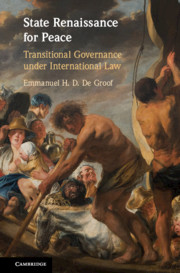Book contents
- Reviews
- State Renaissance for Peace
- State Renaissance for Peace
- Copyright page
- Dedication
- Contents
- Tables
- Foreword
- Preface
- Acknowledgements
- Additional material
- Abbreviations
- Introduction Transitional Governance Today
- Part I The Unchartered Territory of Transitional Governance
- Part II Foundation and Actors of Transitional Governance * Sources of Ius in Interregno
- Part III Self-Determination through Transitional Governance
- 6 Limits Ratione Temporis and Materiae to Transitional Governance
- 7 The Practice and Discourse of Inclusion
- Part IV Moderating External Influence on Transitional Governance
- Index
7 - The Practice and Discourse of Inclusion
from Part III - Self-Determination through Transitional Governance
Published online by Cambridge University Press: 10 September 2020
- Reviews
- State Renaissance for Peace
- State Renaissance for Peace
- Copyright page
- Dedication
- Contents
- Tables
- Foreword
- Preface
- Acknowledgements
- Additional material
- Abbreviations
- Introduction Transitional Governance Today
- Part I The Unchartered Territory of Transitional Governance
- Part II Foundation and Actors of Transitional Governance * Sources of Ius in Interregno
- Part III Self-Determination through Transitional Governance
- 6 Limits Ratione Temporis and Materiae to Transitional Governance
- 7 The Practice and Discourse of Inclusion
- Part IV Moderating External Influence on Transitional Governance
- Index
Summary
TG must be carried out inclusively, and with due respect for the continuous principle of self-determination. The ‘inclusion cascade’ read in conjunction with this principle goes further than the procedural right to a constitutional referendum and general elections towards the end of the interregnum, yet requires less than substantive democracy. TA are expected to favour broad and progressively inclusive popular participation whereby answers to questions as to who to include, how and when are gaining precision. The concept of population is being redefined and inclusivity becomes a must for some techniques (notably constitution-making) and at some moments (notably towards the end) of the transition. In the same context, TA usually commit to some form of TJ and, subject to a few limitations, may choose how to do so. These practices contribute to custom formation in relation to TG. At the same time, the principle of self-determination gains in precision through such practices mostly seen as obligations of conduct.
Keywords
- Type
- Chapter
- Information
- State Renaissance for PeaceTransitional Governance under International Law, pp. 224 - 274Publisher: Cambridge University PressPrint publication year: 2020

